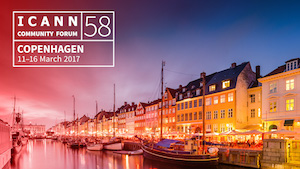New gTLD auction proceeds cross community working group meeting
22 Mar 2017 01:00h
Event report
The New gTLD Program established auctions as a mechanism of last resort to resolve string contention. Although most string contentions have been resolved through other means before reaching an auction conducted by ICANN’s authorised auction service provider, significant funds have accrued as a result of several auctions.
These auction funds have been put aside by the ICANN Board, until there is a plan for the appropriate use of the funds. A drafting team composed of representatives of supporting organisations (SOs), advisory committees (ACs), and the Board was convened, and prepared the charter for the Cross–Community Working Group on new gTLD auction proceeds (CCWG), responsible to devise that plan.
The Chair, Mr Jonathan Robinson, started the meeting in Copenhagen with a recap of the CCWG charter provisions and the legal and fiduciary constraints that need to be observed by the WG. The charter has strong requirements with regards to avoiding potential conflicts of interests: statements of interest need to be filled by members, as well as declarations whether the members (or their organisations) plan to apply for funds. One of the main questions posed to the CCWG members was whether the group believes that ICANN or its constituencies should be able to apply for ICANN auction funds for the future.
There was also a recap of the goals and objectives of the group, as defined by the charter:
- Developing a proposal for consideration by chartering organisations on a mechanism to be developed in order to allocate new gTLD auction proceeds.
- Consider the scope of fund allocation under the necessary conditions to preserve ICANN’s tax status (Californian non-profit corporation).
- The CCWG will not make decisions on who will receive the funds.
The focus of the group so far has been: a) to provide an assessment of CCWG members’ skills and expertise, to identify the shortcomings on expertise that may require the supplement of external input; b) to identify topics that may require further briefings/information to ensure common understanding.
During the development of a work plan, the group reviewed the questions proposed by the charter to identify: Are any of them gating questions that need to be answered beforehand? Are any key questions missing? Is any external expertise required to address charter questions? The mapping out of a possible timeline.
Ms Samantha Eisner, Deputy General Counsel at ICANN, started her presentation by explaining that any funds that ICANN spends need to be within the remit of its mission. ICANN also proposed some guidelines and principles for consideration in the work of the group:
- Consistency with ICANN’s mission as set out in bylaws.
- Private benefit concerns. ICANN may only spend the funds for public benefit purpose, not direct to a private actor. The group needs to build in protection with regards to that.
- Because of the US tax exemption status, the funds must not be used for political activity. They should not be used for lobbying activities, such as attempts to influence legislation.
- Decisions have to be taken without a conflict of interest. ICANN is prohibited from benefiting insiders to ICANN, such as the staff or the Board. Community conflicts of interest should also be taken into account.
- There are several ways in which the CCWG can help maintain the integrity of the process: transparent assessments of how the recommendations contribute to this integrity; considering the use of established mechanisms for disbursing the funds, as opposed to calling for development of untested modalities; recommendations that enhance transparency; etc.
- Financial and fiduciary concerns. The Board and officers of ICANN hold fiduciary duties to the organisation to make sure that self-dealing does not occur and their private interests are not benefited through ICANN’s decision making and actions.
A letter from the ICANN Board also details some specific considerations for the group, mentioning certain mechanisms and principles that the Board would like to see considered:
- Legal and fiduciary constraints of ICANN
- Important items to the cost of operation of the CCWG:
- The CCWG should run as a project with proper budget and schedule, based on a working plan.
- Auction proceeds will remain curtained off until the next phase, when an approved plan for distribution is in place;
- Once a system is set up for distribution, the cost of administering the distribution of the funds will naturally come out of the auction proceeds.
- The CCWG must cast a wide net: the focus should be on general principles and objectives.
- Conflicts of interest need to be carefully assessed.
The group conducted a survey as an initial assessment of the charter to determine whether some of the questions contained in the document should be considered fundamental, and whether external expertise may be needed to reply to some of the questions.
The next steps for the group are: a) review the letter from the Board in order to provide an equally substantive response; b) analyse the result of the survey and match it with the questions in the charter.
The deck of slides presented during the meeting and the full transcript of the session are available online.
Related topics
Related event

